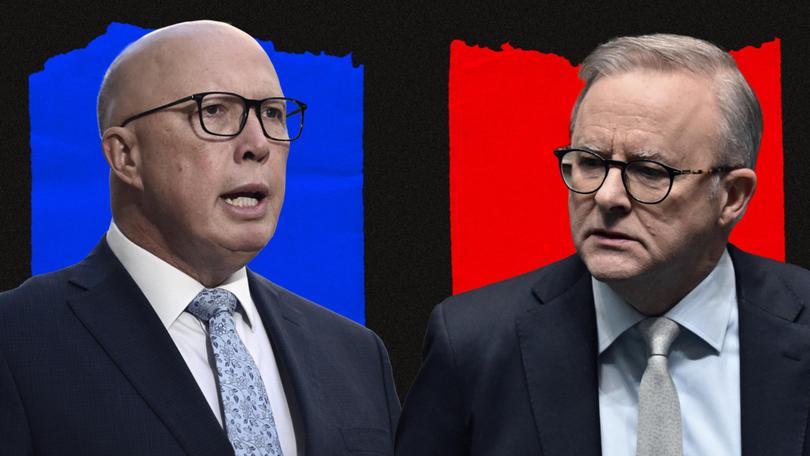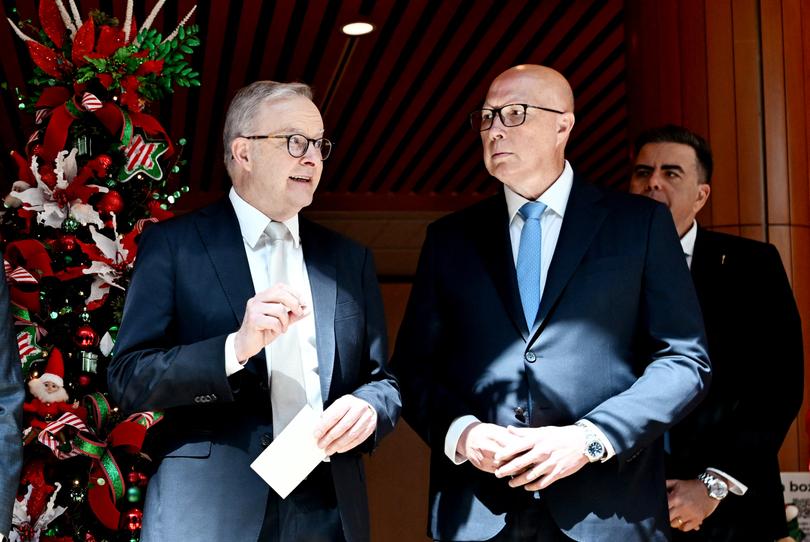KATINA CURTIS: The ‘double haters’ Albanese and Dutton should be worried about at the next Federal election
With the Federal election just around the corner, there’s a figure that’s worrying both Labor and Liberal strategists. One in seven Australians are ‘double haters’ — they dislike both Albanese and Dutton.

Australia’s copy of the Magna Carta returned to public display on Wednesday after eight long years.
Visitors to Parliament House can again gaze on the 727-year-old document — one of only four known copies — and be reminded of the fundamental principles that government should be by consensus and no one is above the rule of law.
But centuries on from the rebellion over taxation without consultation that led to its creation, do voters actually care to be consulted?
Sign up to The Nightly's newsletters.
Get the first look at the digital newspaper, curated daily stories and breaking headlines delivered to your inbox.
By continuing you agree to our Terms and Privacy Policy.How much do you think your vote or voice can change things?
Australians are about to get an avalanche of politics with the Federal election early in the new year.
Political strategists are working out how to get people not only focusing on politics but on thinking their vote matters.
For all the comparisons between the state of politics in Australia and America, compulsory voting Down Under continues to be a fundamental difference.
But it doesn’t mean people are enamoured with or even interested in politics.
Just over half of people surveyed for the latest update in ANU’s long-running stocktake of political attitudes were not interested in politics.
The care factor was even lower for young voters.
That generational divide is just one way the electorate appears to be fracturing.
Lower-educated people were significantly less likely to trust government, democracy or institutions than those with university degrees.
Men were more likely than women to identify as right-wing.
Women were twice as likely to be undecided voters, were less interested in politics and felt less able to participate.
But the figure that might worry Labor and Liberal strategists the most is the one in seven Australians who are “double haters” — they dislike both Anthony Albanese and Peter Dutton.
The phenomenon came to the fore in the US presidential election where a significant chunk of the electorate didn’t like Donald Trump or either of the Democrat alternatives, Joe Biden or Kamala Harris.
It’s closer to one in five saying “a pox on both your houses” among the younger working population, aged up to 44.

They are about half as likely to be satisfied with democracy or the country’s direction, and their confidence in the Federal government is just a third of the broader population level.
Pushed on who they would vote for, these double-haters were far more likely to vote for the Greens or other parties — and significantly less likely to tip over into Labor’s column.
It puts hard numbers to what politicians are hearing while knocking on doors and meeting people at shops.
Already roughly a third of the country doesn’t vote for one of the major parties.
Their preferences spray unpredictably, especially if the top choice is a single-issue micro party or an independent.
Albanese and Dutton have been narrowing their focus recently to warn about the dangers of further expanding the crossbench, whether by adding Greens or independents.
American politicians sought to reach disengaged voters by going on podcasts like Joe Rogan, Shawn Ryan or Charlamagne the God.
It’s tricky to pinpoint who the Australian equivalents would be — not least because Australians consume the American exports just as voraciously.
The other hard numbers out this week are economic ones.
Treasurer Jim Chalmers and Albanese regularly rattle off the indicators heading in the right direction, notably inflation more than halving since May 2022.
Economic growth is sluggish but still growing and the same can now be said of disposable incomes.
Data from the big four banks shows the number of people seeking hardship arrangements or in arrears on their home loans has plateaued since the middle of the year.
But voters disengaged from politics will act on their gut feelings about the economy, no matter what the figures say.
And gut feelings lag economic indicators.
Even if there was an interest rate cut before the election – looking increasingly unlikely – it would take some six months for people to feel the effect.
Some MPs are still finding people don’t know they got a tax cut in July.
The “how do you feel” battle has been playing out for months already; Dutton was using the line well before people credited it for Donald Trump’s victory.
Albanese is trying to re-frame it as “you’d be feeling a lot worse if it was up to the other mob”, but trying to sell this kind of counterfactual is a hard ask.
They are trying to win over people who increasingly don’t trust politicians or governments or even democracy.
Yet they deserve to be consulted on how they are governed just as much as any Australian.

